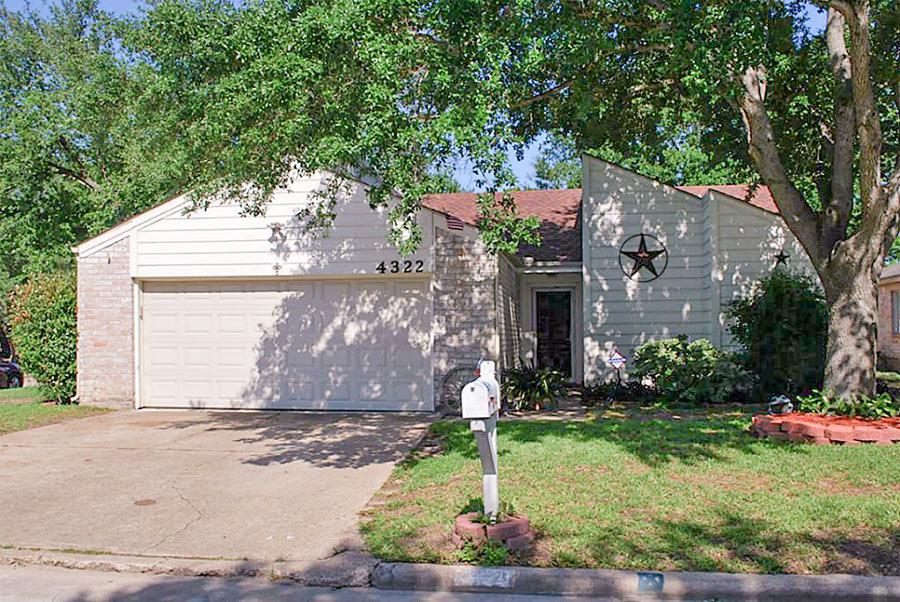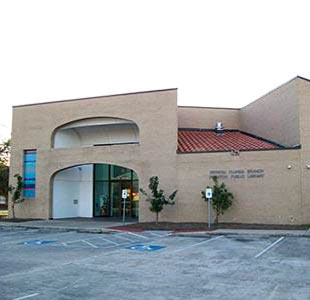HERE COME THE HARVEY LOW BALLERS  Outsiders moving into town to buy up homes from distressed owners for pennies on the dollar in the wake of local catastrophe is a proud and longstanding Houston tradition: It keeps the city’s reputation for real-estate shenanigans intact, even as oldtimers mellow. It’s how Sir Allen Stanford got his illustrious start! Plus: Investments that must be recouped can help keep zombie neighborhoods that maybe-shouldn’t-have-been-built-there-or-that-way-in-the-first-place alive. But you don’t have to be a wet-carpetbagger to get in on the fun: Reporter Prashant Gopal heads to the Redneck Country Club on Airport Blvd. in Stafford for a well-attended pep talk by local trashed-home recycler Eddie Gant, then follows local real-estate agent Bryan Schild as he drives through neighborhoods looking for deals: “One of Schild’s prospects is Joseph Hernandez, a disabled U.S. Army veteran married to a housekeeper. The couple are living in a hotel and saving money by eating only two meals a day. Schild has made them a painful offer. If they walk away from their two-bedroom house, worth $127,000 before Hurricane Harvey, Schild will pick up the mortgage payments, paying nothing else. Although he says he sympathizes with the Hernandezes’ plight, he thinks the offer is fair because he figures the home is now worth less than its $65,000 mortgage. Hernandez is in a bind. He didn’t buy flood insurance because his house wasn’t in a high-risk area. He can’t afford to rebuild, and he’s been told he’s eligible for only $23,000 in federal assistance. If he turns over the deed, he’s looking at losing the entire $60,000 in equity he had before the flood. ‘It’s blurry, what’s coming,’ he says. ‘We’ll probably have to sell to an investor, and that’s not good. We were forced out.’†[Bloomberg BusinessWeek] Photo of Hernandez’s home in Bear Creek Village, before it flooded: HAR
Outsiders moving into town to buy up homes from distressed owners for pennies on the dollar in the wake of local catastrophe is a proud and longstanding Houston tradition: It keeps the city’s reputation for real-estate shenanigans intact, even as oldtimers mellow. It’s how Sir Allen Stanford got his illustrious start! Plus: Investments that must be recouped can help keep zombie neighborhoods that maybe-shouldn’t-have-been-built-there-or-that-way-in-the-first-place alive. But you don’t have to be a wet-carpetbagger to get in on the fun: Reporter Prashant Gopal heads to the Redneck Country Club on Airport Blvd. in Stafford for a well-attended pep talk by local trashed-home recycler Eddie Gant, then follows local real-estate agent Bryan Schild as he drives through neighborhoods looking for deals: “One of Schild’s prospects is Joseph Hernandez, a disabled U.S. Army veteran married to a housekeeper. The couple are living in a hotel and saving money by eating only two meals a day. Schild has made them a painful offer. If they walk away from their two-bedroom house, worth $127,000 before Hurricane Harvey, Schild will pick up the mortgage payments, paying nothing else. Although he says he sympathizes with the Hernandezes’ plight, he thinks the offer is fair because he figures the home is now worth less than its $65,000 mortgage. Hernandez is in a bind. He didn’t buy flood insurance because his house wasn’t in a high-risk area. He can’t afford to rebuild, and he’s been told he’s eligible for only $23,000 in federal assistance. If he turns over the deed, he’s looking at losing the entire $60,000 in equity he had before the flood. ‘It’s blurry, what’s coming,’ he says. ‘We’ll probably have to sell to an investor, and that’s not good. We were forced out.’†[Bloomberg BusinessWeek] Photo of Hernandez’s home in Bear Creek Village, before it flooded: HAR





How is offering the market value a “lowball”? If the property is worth more, then someone will pay it. But the reality is that the storm wiped out most, if not all, of the improvement value, plus a chunk of the land value. Even if he were insured and rebuilt, it will still all be worth less than before. Investors, local or not, are taking a risk on the deal, and that means they expect a suitable yield. Don’t like it? Don’t sell. But don’t confuse reality with villainy.
Looks like a win win to me. Although this scenario leans more on the predatory side, you still would have to wonder why would anyone want to continue paying mortgage on something they cannot live in nor afford to fix up?!?! Even if they could get a home equity loan to renovate, they would never get enough to recover. This situation is very sad and unfortunate for many going through it.
This is a more philosophical argument, but I firmly believe that in America, we have a society-wide misguided belief that for the middle class:
1) Owning a home is the penultimate financial achievement of one’s life,
2) Our homes should be our biggest lifetime financial investments, and
3) The values of those homes is guaranteed to grow and offer a solid return in the long run.
This mythic and romantic ideal is fueled by the real estate industry, mortgage lenders and banks, generous government tax breaks and incentives, and lately by H&G televisions shows and networks. And by prejudices inherent to our society. #1 is subjective to one’s preference for lifestyle and culture, which is usually dictated by familiarity – and since most middle class Americans today (at least in the Houston area) grew up in a suburban-style single-family house, that is what they know and appreciate, having never been exposed to alternate ways of living. For #2, I would argue that education, ability to weather emergencies (esp. medical, fire, and death – and now add floods), and retirement should all trump owning a property in the financial priority list. As for #3, there is no guarantee that your home will retain its value, much less grow to a reasonable rate of return. Your house sits there like a piece of lead while the world churns around it – from natural disasters to demographic changes to school rezoning to macro economic trends and events – they all affect your home’s value, and you have no control over any of them.
I feel really bad for the people facing these decisions after being flooded, because there are no easy or good solutions. But I place at least part of the blame on our society for being so blindly focused on single-family home ownership, that’s what got a lot of these people into these situations in the first place. We are generally willing to take on more financial risk than is prudent when it comes to choosing to buy a home.
@SuperDave
Yeah, real estate is a terrible investment. I’d rather own stock in a company with a 600:1 PE ratio….nothing could go wrong there…..
well said, Superdave!
If “[o]wning a home is the penultimate financial achievement of one’s life”, then what’s the ultimate financial achievement? Selling it?
The lesson here is that the guys with the big bags of money always wins and the people with the little bags of money always lose. Developers come to Houston with big bags of money and throw around their influence so they can build in the middle of a flood control reservoir without any meaningful disclosure to home buyers. When the flood control reservoir does exactly what it was designed to do, the home owners take the loss while another guy with a big bag of money has an opportunity to flip the properties and make another big bag of money.
@ Superdave: I can agree with your philosophy on the inflated emotional attachment of owners to homes. I view my ownership as just a hedge against a yearly rent hike in an apartment complex. If I could get a 5-year fixed lease (even with a mild annual escalator clause), I’d gladly take it.
.
So, I own my place but am not emotionally wedded to it or look to it as the “golden ticket” to retirement riches. That’s what a 401k, Roth IRA, taxable stock account, and little debt are all for.
.
@ SFP: You don’t have to buy a stock with a P/E of 600. Plenty of reasonable companies in the 10-20 P/E range. But, yes, the market is still expensive.
Superdave: I agree. I spent most of my life hearing that renting was “just throwing your money away,” as if property never decreased in value, and as if the time and money spent on maintenance didn’t have any value of its own. My parents bought a house in 1981 for $90K, paid off a 30 year mortgage, and today the house is worth…$90K. Do the math. Buying guarantees you nothing. Might lose your shirt. Might make out like a bandit. Maybe you’ll break even. Hope you like the neighborhood.
I do currently “own” (mortgaged) a house (never flooded, but flood-insured anyway), but it was only because there were a lot of long-term factors that made me think it was a decent bet. I’m near public transportation. My house is single-story (good for when I’m old). I’m near the Med Center (also good for when I’m old). And I have a studio that I can rent on the cheap in return for help with cooking and cleaning, if age makes those tasks difficult. And if money is tight after I’ve retired, I can live in the studio and rent out the house. My proximity to UH, Rice and TSU guarantees I should be able to find good tenants, should it come to that.
My point? Only that buying a house is very risky, and you can lose your butt just as easily by buying as by renting. You have to think long-term and accept that you might guess wrong. I like to think I guessed right on my purchase, but I accept that if life deals me a different hand, I’ll at least be able to say that I didn’t jump into home ownership under the illusion that buying is always a better bet. Life doesn’t come with any guarantees, and maybe that’s the big takeaway here.
I think everyone missed the key scam here, the “buyer†said he’ll take over the mortgage payments, that’s not a sale. He’ll float it for a few months to see if he can flip it and if not, he’ll just walk, leaving the original owner in even worse position.
SuperDave said it well.
Real estate is a relic from when there just weren’t that many places to stash money if you weren’t a 1%-er.
A house, or just about anything else, sells for a willing buyer and willing seller agree to. It does not matter the hard luck sob story attached to it. This guy should get his home listed on the MLS and get offers from others. That said, this buyer is offering $65K, mortgage value, and will likely have to put in $35K in repairs. Since home is in area that floods, it’s not likely to be worth $127K anytime soon, so $65K is probably a very fair offer.
@Sisiphus, at least your parents have something they can sell for $90k. If they had rented, they would have paid out about the same amount, and would have had nothing but memories.